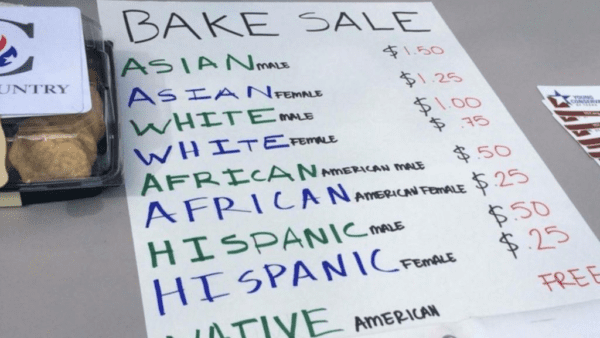
Many institutions consider issues of ethnicity along with academic achievement to determine admission decisions. The University of Texas at Austin admissions process uses an individualized holistic review that takes into account the applicant’s class rank in high school, SAT/ACT scores, record of achievements, honors, work and service in and out of school, socioeconomic status, cultural background, race and ethnicity, as well as recommendations and the competitiveness of the major to which the student applies. This program, labeled by some as “affirmative action,” at the flagship school of the University of Texas system was not without its critics. The Young Conservatives of Texas (YCT) orchestrated a “bake sale” on October 26, 2016 in the popular West Mall area in order to demonstrate how these affirmative action considerations are unjust. The day before the bake sale, the YCT posted the following comment on their Facebook page:
YCT is a truly colorblind organization and believes that all government institutions are constitutionally prohibited from discriminating on the basis of race in all circumstances, including affirmative action. Join us in the West Mall for a not so traditional bake sale! Our bake sale will have a tiered pricing method intended to illustrate this disastrous policy that demeans minorities on our campus by placing labels of race and gender on their accomplishments.
During the demonstration, the YCT priced baked goods based on the potential buyer’s gender and race. Prices were the highest for Asian men who had to pay $1.50 for a cookie. Native Americans, both male and female, could take home a cookie for free. This was YCT’s attempt to show the preferential treatment they believe is taking place in the application process.
This provocative display did not go unnoticed. Many Texas students were furious with the bake sale, arguing that it was racist. One of outraged students commented, “This is offensive, ignorant, ahistorical, inaccurate, and bigoted.” Over 300 students surrounded the bake sale table and drowned out the appeals of the YCT’s demonstration with shouts of “Racists go home!” The table was eventually flipped over and the YCT members were forced to evacuate. Dr. Gregory J. Vincent, the Vice President for Diversity and Community Engagement at the University of Texas at Austin, sent out a statement saying the methods of the YCT are inflammatory and demeaning. He argued that they created an environment of exclusion and disrespect through their display in the West Mall, a place where students typically exhibit respect for each other while speaking their viewpoints. Dr. Vincent ended his official statement on behalf of the university by voicing his opinion that the even though the YCT has a right to free speech, it is “deplorable” that they took advantage of this space to direct negative sentiments toward their peers. Not only were students expressing themselves on social media, the President of the University of Texas at Austin, Dr. Gregory Fenves, also tweeted his disapproval: ‘’[The] ‘Bake Sale’ does not reflect UT values. Diversity and inclusion will always be top priorities.”
Those who were in charge of the bake sale believed that they were presenting their stance on the issue of affirmative action in a strategic and clear way, even if it was controversial. YCT’s chairman, Vidal Castañeda, stated, “It is insane that institutional racism, such as affirmative action, continues to allow for universities to judge me by the color of my skin rather than my actions … YCT-UT will not be deterred by liberal elites that would love nothing more than to silence conservative, common sense voices on campus.” Another supporter explained, “I applaud this effort of exposing the truth. Affirmative action is unfair.” YCT’s president, Lorenzo Garcia, argued that they hoped to demonstrate that “It may be demeaning to minorities to say that they need affirmative action to succeed” and that “A society cannot truly be color blind until they stop making decisions based on race.”
By placing race and gender into a hierarchy of importance in this protest, many observers felt attacked and offended by the YCT. Yet many would consider offense and provocation to be a sign of a successful public campaign of advocacy and agitation for social change. The YCT demonstration was meant to be a very visible call for action concerning an issue its members judged as extremely important. Were their creative and provocative communicative tactics half-baked, or perfectly done given the importance they placed on this issue?
Discussion Questions:
- Should the YCT have formulated their protest method in this specific way? Why or why not?
- What are the important ethical decisions that must be made by a group intent on protesting a controversial issue?
- What are the important decisions that counter-protesters have to make in responding to a controversial demonstration? What values or standards of ethical conduct guide ethical responses to controversial protests?
- How should a university and its officials respond to unpopular acts of protests on its campus?
- What makes a protest or demonstration both ethical and effective? Are there ways that these two values might come into conflict? How would you resolve such conflicts in demonstrating on an important, but controversial, issue?
Further Information:
Gregory J. Vincent, “Statement Regarding YCT Affirmative Action Bake Sale from Dr. Gregory J. Vincent.” October 26, 2016. Available at: http://diversity.utexas.edu/2016/10/26/statement-regarding-yct-affirmative-action-bake-sale/
Sophie Lewis, “UT Young Conservatives host Affirmative Action Bake Sale.” CNN, October 28, 2016. Available at: http://www.cnn.com/2016/10/28/us/university-bake-sale-trnd/index.html
The University of Texas at Austin, “Freshman Application Review.” 2018. Available at: https://admissions.utexas.edu/apply/decisions/freshman-review
Van Nguyen, “Anti-affirmative Action Bake Sale causes Protest, sparks Discussion.” The Daily Texan, October 27, 2016. Available at: http://www.dailytexanonline.com/2016/10/26/anti-affirmative-action-bake-sale-causes-protest-sparks-discussion
Authors:
Morgan Malouf & Scott R. Stroud, Ph.D.
Media Ethics Initiative
University of Texas at Austin
February 14, 2018
Image: Katie Bauer
This case study can be used in unmodified PDF form for classroom or educational settings. For use in publications such as textbooks, readers, and other works, please contact the Center for Media Engagement.
Ethics Case Study © 2018 by Center for Media Engagement is licensed under CC BY-NC-SA 4.0



